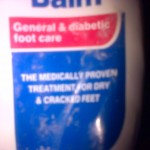
Diabetic foot cream
Welcome to our latest blog post on the subject of diabetes. This is the first in a series of posts looking at some the complications of faced by diabetics. You can check out our previous posts on diabetes
here.
As with all our blogs we like to encourage our readers to take part in the discussion and share their stories about treatments and successes. So please feel free to use the comments box below to add anything you think will be of interest to our readers.
The main reason to spotlight foot ulcers that are caused by diabetes is that they can, in some cases, lead to amputation of the foot.
If you or a loved one have any worries at all about a diabetic foot ulcer or indeed a wound on your feet please see a healthcare professional as soon as possible; as it has been suggested that one in ten diabetics will go on to develop diabetic foot ulcers. In fact both Type 1 and type 2 diabetics are susceptible to diabetic foot ulcers.
So what is a diabetic foot ulcer and why is it of particular concern to diabetics?
Clearly foot ulcers can happen to anyone. That being said the problem here is that the fluctuation of blood sugar levels means that they are considerably harder to heal due to diabetic neuropathy (or nerve pain). Because neuropathy can lead to deadened pain sensations this in turn means that even very mild injuries can turn into diabetic foot ulcers.
Clearly prevention is the key issue here. In particular regular inspections of the feet for any signs of injury. Another suggestion is daily application of a moisturising cream.
As we mentioned above a foot ulcer can lead to amputation or debridement (which is removal of the damaged flesh). Before that of course antibiotics are often used as well. Interestingly hyperbaric oxygen therapy can be used to reduce the risk of amputation.
As one of the aims of this post is to help our readers share their experiences of diabetic foot ulcers. It would be great if you could use the following questions as a guide
- What kind of diabetes do you have? How long ago were you diagnosed?
- Have you ever had a diabetic foot ulcer?
- How the ulcer was treated and was it successful?
- Have you used hyperbaric oxygen therapy what was it like?
- What do you do now to prevent diabetic foot ulcers?
These questions are obviously only a guide so please use the comments boxes below to add any part of your story which you think will be of use to other readers. Feel free to comment and share advice on other peoples comments. Any links to other sites would be great as well.




